This site is supported by our readers. We may earn a commission, at no cost to you, if you purchase through links.
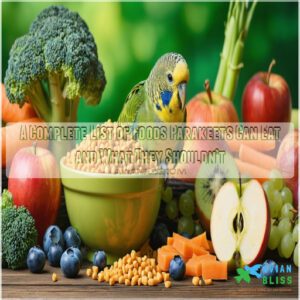 Parakeets can eat a colorful mix of fruits like apples (no seeds), bananas, and berries, plus veggies like broccoli, carrots, and leafy greens.
Parakeets can eat a colorful mix of fruits like apples (no seeds), bananas, and berries, plus veggies like broccoli, carrots, and leafy greens.
For extra protein, try unsalted, raw nuts or the occasional cooked egg.
Their main diet should be quality pellets (60-70%) to keep them healthy.
But watch out! Foods like chocolate, avocado, onion, garlic, and seeds from apples or cherries are big no-nos—they’re toxic.
Also, skip sugary, salty, or fatty snacks—they’re as bad for them as eating chips for dinner is for us!
A balanced diet keeps your feathered friend chirping happily—just like a bird should, with a diet that includes quality pellets and avoids toxic foods.
Table Of Contents
- Key Takeaways
- Fruits Parakeets Eat and Their Benefits
- Vegetables Parakeets Eat
- Nuts Parakeets Eat
- Other Appropriate Foods Parakeets Eat
- Snacks and Treats Parakeets Eat
- Most Toxic Foods for Parakeets
- Non-Toxic, but Not Recommended, Foods Parakeets Should Avoid
- Tips for Feeding Your Pet Parakeet
- Frequently Asked Questions (FAQs)
- What can parakeets not eat?
- Can parakeets eat forbidden fruits and vegetables?
- What fruits do parakeets eat?
- Do parakeets eat vegetables?
- Can parakeets eat dairy?
- Can parakeets eat fruit pits?
- What can parakeets eat and not eat?
- What is toxic to parakeets?
- What is a parakeet’s favorite human food?
- Can parakeets eat cheerios?
- Conclusion
Key Takeaways
- Don’t give parakeets harmful foods like chocolate, avocado, onions, garlic, or fruit pits—they’re toxic and can be deadly.
- Stick to feeding them a balanced diet with 60-70% quality pellets, plus safe fruits like apples (no seeds) and berries, and veggies like carrots or broccoli.
- Treats like millet or plain Cheerios are fine occasionally, but avoid sugary, salty, or fatty foods—they’re unhealthy for your bird.
- Always wash produce, cut it into small pieces, and introduce new foods gradually to ensure your parakeet’s health and safety.
Fruits Parakeets Eat and Their Benefits
Your parakeet will love nibbling on fresh, juicy fruits, and they’re packed with nutrients that keep them healthy and happy.
Just make sure you stick to safe options and avoid anything that could harm their tiny tummies!
Nutritional Benefits
A parakeet’s diet thrives on fruits packed with vitamins and minerals.
Vitamin C boosts their immunity, while vitamin A keeps their vision sharp and feathers vibrant.
Potassium? It’s like a gym trainer for their muscles—strong and steady!
These fruity gems also deliver natural sugars for bursts of playful energy and fiber to keep their tummies happy.
For a detailed dietary guide, explore this helpful resource on parakeet nutrition information.
Want to see your bird shine?
Look for parakeet-safe fruits to provide superior nutrition.
A balanced parakeet diet isn’t just about feeding—it’s about supercharging their energy, building beak strength, and showcasing those glowing feathers like a tiny runway model!
Recommended Fruits in Moderation
You’ve mastered your parakeet’s core nutrition – now let’s talk about nature’s candy! While fruits are tasty treats, think of them as your feathered friend’s dessert menu.
Fresh fruit should make up about 10-15% of their daily diet. Certain fruits, like apple seeds, contain cyanide and should be avoided completely, according to this list of toxic parakeet foods.
- Tropical treasures like mangoes, melons, and figs offer a rainbow of vitamins
- Dried apricots (soaked first) and tomatoes make perfect bite-sized snacks
- Berries pack powerful antioxidants in tiny packages
Mix it up! Rotate between different fruits to keep your birdie interested and healthy. Just remember to wash everything thoroughly and remove any seeds or pits – they’re like tiny troublemakers for your feathered pal.
Vegetables Parakeets Eat
Just like us, your feathered friend needs a colorful mix of leafy greens and fresh carrots for exceptional bird nutrition.
Each daily serving of vegetables good for parakeets packs a punch of vitamins and minerals that’ll keep your buddy chirping with joy.
Parakeets can enjoy bananas in moderation, as detailed in this guide to feeding bananas.
Here’s what veggies can parakeets eat safely:
- Broccoli florets and stems work like tiny trees of health
- Sweet potatoes (lightly cooked) make perfect vitamin-packed treats
- Butternut squash offers a naturally sweet veggie adventure
- Celery with leaves attached provides extra enrichment
- Fresh dandelion greens spark foraging instincts
Follow these vegetable safety tips to keep your pal healthy:
- Wash all produce thoroughly
- Cut into tiny, beak-friendly pieces
- Start with small amounts of new foods
- Skip toxic options like avocado
- Remove uneaten veggies within 4 hours
Pro tip: Think your bird’s being picky? Try serving parakeet vegetables during morning playtime when they’re most energetic.
Remember, variety is the spice of life – even for our feathered friends!
Nuts Parakeets Eat
Ever wondered which nuts can add a nutritious crunch to your parakeet’s diet?
While nuts pack a powerful punch of Healthy Fats and protein, they’re best served as occasional Crunchy Snacks rather than daily fare.
Your feathered friend can safely enjoy almonds, Brazil nuts, cashews, and pistachios – just keep them unsalted and either raw or lightly roasted.
Like picking the perfect Seed Options, proper Nut Storage is vital – always check for any signs of mold before serving.
Think of nuts as your parakeet’s version of premium dark chocolate – a little goes a long way!
The Nutrient Value in walnuts, macadamia nuts, and pecans supports your bird’s health, but remember: can parakeets have peanuts unsalted?
Yes, but only human-grade ones, and in moderation.
Store nuts in an airtight container in a cool, dry place, and your parakeet will always have fresh, safe treats to enjoy!
Other Appropriate Foods Parakeets Eat
You’ll be amazed at how many everyday foods can make your parakeet’s beak water, just like a kid in a candy store.
Beyond the usual seeds and fruits, your feathered friend can safely enjoy treats like pellets, hard-boiled eggs, and even small bits of whole-grain bread that’ll keep them chirping with joy.
Pellets
A balanced diet starts with quality parakeet food pellets as your feathered friend’s daily foundation.
Top brands like Lafeber’s Premium Daily Diet offer complete nutrition that keeps your bird thriving.
You’ll need these pellets to make up about 60-70% of their total diet.
Many vendors offer best parakeet pellets online.
Store pellets in a cool, dry place to maintain freshness.
Choose cold-pressed pellets to preserve natural nutrients.
Replace uneaten pellets daily to guarantee quality.
Mix with their current seed blend for easier adaptation to a new diet.
Protein Sources
Now that you’ve got pellets covered, let’s power up your feathered friend with protein!
Mix shredded chicken or egg nutrition into their daily meals.
Just think of protein as your bird’s personal energy booster.
| Source Type | Options | Benefits |
|---|---|---|
| Animal | Hard-boiled eggs, lean chicken | Complete proteins |
| Plant | Tofu, lentils, beans | Gentle digestion |
| Natural | Mealworms, seeds, quinoa | Rich nutrients |
Want a quick protein boost?
Try some mashed legumes – your bird will thank you!
Corn and Its Risks
Let’s explore what you need to know about corn and your parakeet’s health.
While corn‘s a common ingredient, it needs careful consideration.
- Ground cornmeal in quality pellets is generally safe
- Whole kernels can cause digestive blockages
- Fresh corn might harbor pesticides or bacteria
- Moldy corn contains dangerous aflatoxins
- Baby corn is easier to digest but serve sparingly
Remember, moderation‘s key – your feathered friend has plenty of other nutritious options to enjoy!
Baby Food Options
Caring for tiny feathered friends requires special attention to baby nutrition that’s just right.
When feeding baby parakeets, provide food every 3-4 hours using a special plastic spoon or wide-nozzle syringe.
Keep the temperature steady at 105-110F, just like mom’s natural feeding, which is crucial for their development and health.
| Feeding Guide | Tips & Tricks |
|---|---|
| Feed every 3-4 hours | Use bent-edge spoon |
| Keep temp 105-110F | Place on cozy towel |
| Consult expert first | Choose quality feed |
| Monitor closely | Watch eating habits |
It’s essential to consult expert first and monitor closely to ensure the baby parakeets receive the best care possible, including the right feeding guide and quality feed.
Bread and Its Risks
Though bread might seem like a harmless treat for your feathered friend, it’s actually a risky choice.
While organic, whole-grain varieties are safer than white bread, they still lack essential nutrients your parakeet needs.
Think of bread like candy – it fills them up without providing real nutrition.
Instead of wondering "can parakeets eat bread," focus on fresh fruits, veggies, and quality seeds for a healthier diet.
Snacks and Treats Parakeets Eat
Treats are a fun way to bond with your parakeet, but it’s important to pick snacks that are safe and healthy.
Think of them like dessert for birds—small portions, occasional treats, and nothing that could upset their little tummies!
Peanut Butter as a Treat
Peanut butter for parakeets? It’s a nutty delight, but only as a rare treat.
Stick to organic options without additives, and avoid anything with xylitol—it’s toxic! Smooth peanut butter works best, but don’t overdo it—high fat isn’t bird-friendly.
Monitor for peanut allergy reactions, too. Finding xylitol free peanut butter online can simplify this process.
A small dab now and then keeps their snack game fun!
- Go organic
- Check for xylitol
- Use sparingly
- Smooth texture preferred
Pasta as a Snack
Yes, pasta can be a fun snack for your parakeet, but it’s all about balance.
Offer plain options like whole wheat spaghetti or even soft fettuccine noodles—cooked in water without salt or oils.
For a playful crunch, a small piece of raw pasta works too.
Like pasta, bananas can be a healthy treat in moderation, according to this guide to feeding parakeets bananas.
Just keep portions tiny and infrequent.
Overdoing carbs like this risks bloating or discomfort.
Keep it simple, safe, and occasional!
Honey as a Sweet Treat
Sometimes, a little sweetness doesn’t hurt.
Honey, straight from the hive, is a natural treat for parakeets.
But moderation is key—too much sugar isn’t good for your feathered friend.
Keep portions tiny, like a special dessert.
You can find organic honey for parakeets from various online retailers.
Safer sweet alternatives include chopped fruits or even honeydew melon.
Curious about offering honey?
Here’s how:
- Stick to raw, organic honey.
- Avoid honey-flavored "smackers."
- Only offer once weekly.
- Monitor for overconsumption.
Millet as a Nutritious Snack
Millet’s a tasty snack your feathered friend will love, packed with nutrient value and fiber, it’s a great addition to your parakeet’s diet.
Sprinkle in moderation—too much, and it’s like giving your bird candy for dinner.
Choose fresh millet, store seeds properly, and mix it up with veggies or pellets for balanced bird nutrition.
Most Toxic Foods for Parakeets
Some foods can be downright dangerous for your parakeet, even in tiny amounts.
Knowing what’s toxic, like chocolate and avocado, can help you keep your feathered friend safe and healthy.
Dangers of Chocolate
If you’re tempted to share your chocolate with a parakeet, don’t! Chocolate toxicity is no joke—it’s one of the most dangerous and forbidden parakeet foods.
Theobromine and caffeine in chocolate wreak havoc on their tiny systems. Just a nibble can trigger serious symptoms like:
- Vomiting and diarrhea
- Seizures or tremors
- Dangerous heart rate spikes
- Lethargy or hyperactivity
- Fatal consequences
Stick to parakeet-safe foods and avoid this sweet but deadly treat, as it can lead to fatal consequences.
Harmful Effects of Onion/Garlic
Think onions and garlic are harmless? Think again! These toxic foods parakeets shouldn’t eat can cause anemia, organ failure, or severe tummy trouble.
Other sudden parakeet death causes include toxins, infections, and nutritional deficiencies.
Garlic poisoning and onion allergy are no joke for birds—stop these dangerous kitchen staples from landing in their diet.
| Toxic Compound | Effect on Parakeets | Found In | Safe Alternative |
|---|---|---|---|
| Thiosulphate | Anemia | Onions, Garlic | Kale, Spinach |
| Diallyl Disulfide | Organ Damage | Raw or Cooked Garlic | Broccoli |
| Sulfur Compounds | Red Blood Cell Damage | Onions | Carrots |
| Allicin | Digestive Issues | Garlic Supplements, Garlic Oil | Zucchini |
Risks Associated With Comfrey
Comfrey might look harmless, but it’s trouble wrapped in green leaves.
This toxic plant packs pyrrolizidine alkaloids, causing liver damage and bird poisoning, making it one of the toxic parakeet foods you should avoid completely.
Here’s why comfrey isn’t worth the risk:
- Herbal Risks: Even trace amounts can harm your bird.
- Keep it Out: Avoid this toxic food near your parakeet’s environment.
- Stick to Safe Foods: Focus on parakeet-safe foods instead.
Avocado and Its Toxicity
Regarding avocado and parakeets, it’s a big no-no!
Avocados contain persin, a nasty toxin that can cause breathing troubles or even death in birds.
Can parakeets eat avocado? Absolutely not—it’s one of the most toxic foods for parakeets.
Instead, try bird-safe snacks like almonds or pistachios.
Your bird’s health matters, so keep avocado risks far away!
Fruit Pits and Apple Seeds as Hazards
Did you know an apple core can be dangerous for your parakeet? Those tiny seeds inside turn into cyanide when eaten, and that’s bad news for your bird.
Same goes for other toxic fruit pits, like cherries or peaches. Always take a moment for proper seed removal before offering fruit.
Stick to parakeet safe fruits and vegetables like bananas or chopped apples (without seeds). Wondering, “Can parakeets eat apple treats like applesauce?” Stick to fresh apples – it’s safer and healthier!
Non-Toxic, but Not Recommended, Foods Parakeets Should Avoid
Not all foods labeled “safe” are actually good for your parakeet, and some might cause more harm than you think.
Think of it like giving candy for dinner—sure, it’s not poisonous, but it’s definitely not doing anyone any favors, which relates to the idea of safe foods.
Risks of Moldy Peanuts
Moldy peanuts might seem harmless but can pack a dangerous punch for your parakeet.
Aflatoxins from fungal toxins are highly toxic, so here’s how to stay safe:
- Check for mold before serving.
- Store nuts in airtight containers to avoid moisture.
- Stick to fresh, high-quality peanuts.
- Offer peanut alternatives, like safe seeds or almonds.
Avoid risky foods parakeets can’t eat—it’s their tiny lives at stake!
Dairy and Its Disadvantages
Your parakeet’s delicate tummy won’t thank you for dairy.
Birds lack the enzymes to digest lactose, making them prone to lactose intolerance.
So no, parakeets can’t drink milk.
Even cheese and yogurt, which might seem harmless, can upset their tiny systems.
While not toxic, cheese should be avoided due to potential digestive problems.
While it’s not a death sentence, dairy allergies or nutrient deficiencies could pop up.
Instead, pick calcium alternatives like leafy greens, cuttlebone, or even crushed eggshells.
These are safer and pack the nutrients your bird needs without any belly drama.
Smart choice, right?
Harmful Effects of Mushrooms
Mushrooms might seem harmless, but they can spell trouble for your parakeet.
Some contain toxic compounds that cause mushroom poisoning or digestion issues.
Even safe-looking fungi aren’t worth the fungi risks.
- Fungal toxins in wild mushrooms can be lethal.
- Spores may trigger spore allergies in birds.
- Mushrooms are toxic foods your parakeet’s diet doesn’t need.
Better skip them altogether!
Grit and Its Potential Issues
Some think grit is a must, but for parakeets, it’s more trouble than it’s worth.
Overeating grit can cause digestive issues, respiratory risks, or even beak problems.
These birds don’t need grit since they hull seeds.
Instead, prioritize these:
- Feed a balanced parakeet diet like fruits or pellets.
- Stick to safe foods for parakeets.
- Avoid risky grit types entirely.
- Focus on crop stones alternatives.
Risks Associated With Crackers
Crackers might seem harmless, but they’re trouble for parakeets.
Loaded with salt, empty calories, and unhealthy fats, they can lead to bird obesity and other dietary dangers.
Store-bought crackers also risk choking, thanks to preservatives and sugar.
Craving alternatives? Skip the cracker toxicity and offer seed alternatives or fresh snacks.
Wondering, “Can parakeets eat Goldfish crackers?” Nope, keep those to yourself!
Tips for Feeding Your Pet Parakeet
Feeding your parakeet isn’t just about tossing in some seeds; it’s about keeping their meals safe and healthy.
Start slow with new foods, watch how they react, and remember, a happy bird’s tummy equals a happy bird!
Gradual Transition to New Foods
Switching up your parakeet’s diet? Take it slow!
Mix tiny amounts of new foods with their favorites—sort of like sneaking veggies into a picky kid’s meal.
Gradually increase over 1-2 weeks.
Watch for tummy troubles or if they give you the “What is this?” stare.
Food introduction tips like this keep your feathered buddy enjoying safe parakeet foods!
They help you introduce new items to their diet without causing distress, by making the process gradually.
Monitoring Food Aroma and Consumption
Keep an eye on your bird’s plate—your nose can help too!
Food freshness checks are key, so sniff for anything off.
Watch their consumption patterns; skipping meals or nibbling less might signal spoiled food.
Stick to a feeding schedule for balanced nutrient intake, and adjust portions to avoid waste.
A happy parakeet thrives on safe parakeet foods from a trusted parakeet food list!
Consulting a Veterinarian for Diet Advice
Not sure if you’re feeding your parakeet right? A vet visit clears things up! They’re like your bird’s personal diet coach, weighing in with expert advice.
Here’s why it pays off:
- Veterinary Nutrition: Spot dietary gaps and health concerns.
- Diet Planning: Customize a menu for your bird’s needs.
- Parakeet Food Guide: Verify what’s safe and healthy to feed.
- What Should Parakeets Not Eat: Get clear warnings on risky foods.
Frequently Asked Questions (FAQs)
What can parakeets not eat?
Imagine your bird sneaking a bite of chocolate – it’s toxic!
Avoid avocado, onions, garlic, apple seeds, and sugary snacks.
Also, skip alcohol and dairy.
Some foods can harm them faster than you’d think!
Can parakeets eat forbidden fruits and vegetables?
Steer clear of feeding parakeets forbidden fruits and veggies like avocado, onions, garlic, or fruit pits.
They’re harmful, even deadly.
Stick to what’s safe—better to keep your bird thriving than risking it, right?
What fruits do parakeets eat?
Did you know parakeets thrive on fruits like apples, bananas, and blueberries?
Just skip the seeds and pits!
Toss in mangoes, pears, or melons too, think of it as their fruity buffet—minus the junk!
Do parakeets eat vegetables?
Your feathered buddy can enjoy a variety of veggies, like carrots, kale, and zucchini.
They’re packed with nutrients and keep things interesting.
Just avoid onions, garlic, and iceberg lettuce—they’re no-go zones for your parakeet’s health.
Can parakeets eat dairy?
Did you know over 60% of birds can’t digest lactose?
Parakeets can’t either, so skip the cheese and milk.
Dairy can upset their tiny tummies, leaving them uncomfortable.
Stick to safe, bird-friendly snacks instead!
Can parakeets eat fruit pits?
Fruit pits are a no-go—they’re small but pack a toxic punch with cyanide.
Even a tiny nibble could harm your bird.
Stick to the fruit’s flesh and ditch those pits to keep things safe.
What can parakeets eat and not eat?
Your little buddy can munch on fruits, veggies, grains, and seeds—like apples, broccoli, and millet.
They should avoid chocolate, avocado, and salty snacks, as these are no-go zones for their tiny tummies!
What is toxic to parakeets?
If you wouldn’t feed it to a cartoon villain, don’t give it to your parakeet.
Chocolate, avocado, onions, garlic, fruit pits, alcohol, and caffeine are all toxic.
Play it safe and check everything.
What is a parakeet’s favorite human food?
Your parakeet might go nuts for fresh apple slices, bits of banana, or even a nibble of whole-grain bread.
Just keep portions small, avoid seeds, and don’t share anything sugary or salty!
Can parakeets eat cheerios?
You can give your parakeet plain Cheerios occasionally, but skip the sugary or honey-coated kinds.
They’re low in nutrients, so don’t make it a habit.
Think of them as a rare snack, not a meal.
Conclusion
Feeding your parakeet isn’t rocket science—it’s more like making a colorful salad.
Stick to quality pellets as their main meal, mix in safe fruits and veggies like apples (no seeds) or carrots, and skip toxic foods like chocolate, avocado, or onion.
Treats like millet or pasta are fine in moderation but avoid sugary snacks.
A balanced diet keeps your bird happy and healthy.
Check this complete list of foods parakeets can eat and what they shouldn’t, and you’re golden!


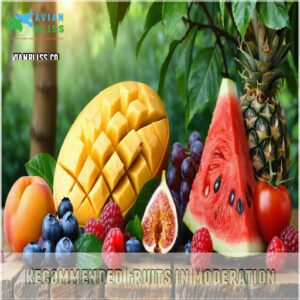
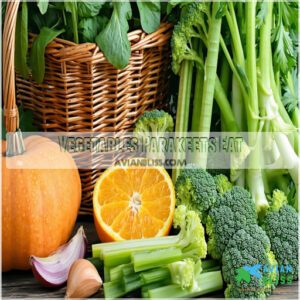
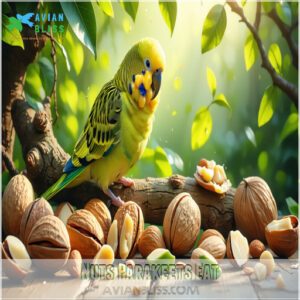
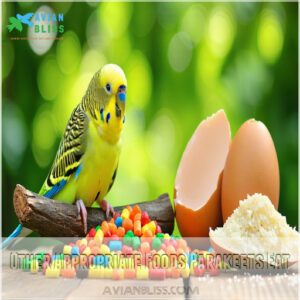
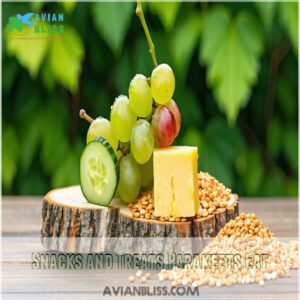
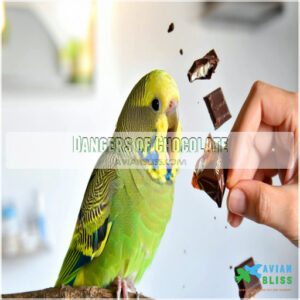
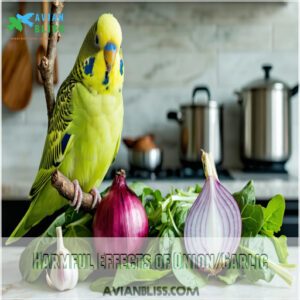
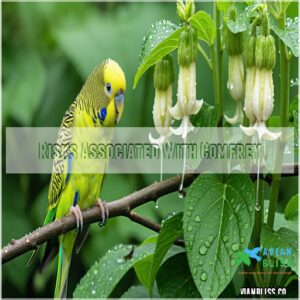
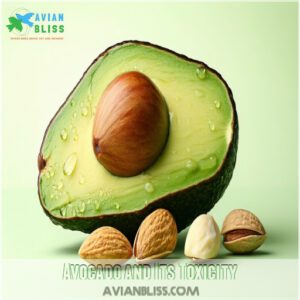
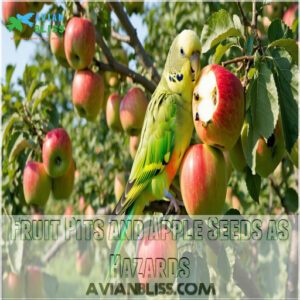
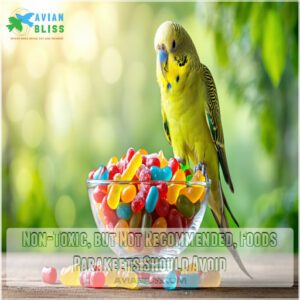
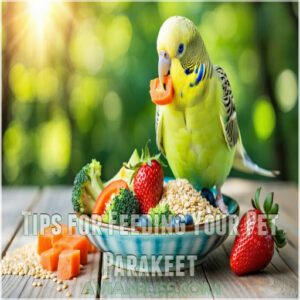



sam spatula
January 24, 2025 at 06:03 PM
i have had parakeets for years and have never and will never give them pelleted food these birds need to forage by giving them pelleted food is takes away the need to forage I prefer seed and fresh fruit and vegetables scattered throughout their cage giving them the need to forage keeping pellets in their cage does not give them the urge and fun to forage.
Niyaz Ali
June 16, 2025 at 10:14 PM
@sam spatula, I agree with you